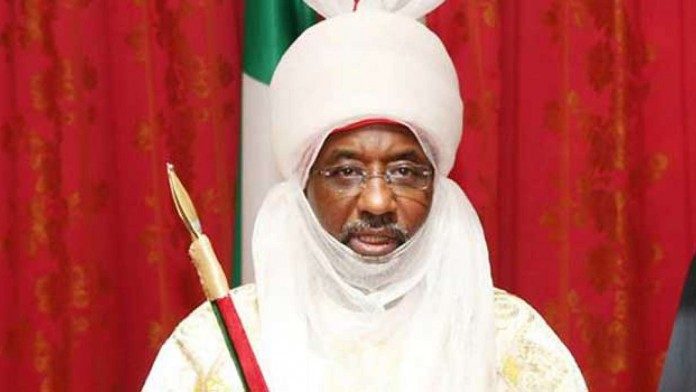By Emeka Alex Duru
Baring interventions from the courts, the days of Mohammed Lamido Sanusi 11, as the Emir of Kano, are over. This followed an announcement on Monday, March 9, 2020, by the Director General, Media and Communications, Kano State Government, Salihu Yakasai, via his official twitter handle. “The Kano State Executive Council has unanimously approved the dethronement of the Emir of Kano, Mallam Mohammed Sanusi 11at a special sitting held today by the council”, he tweeted.
The dethronement marks the final point of the unhealthy relationship between Sanusi and the governor, Abdulllahi Ganduje, that had run for some time.
The impasse began to take turns for the worst when Sanusi’s powers and influence in the Kano Emirate, were drastically whittled, leaving him with mere control of 10 Local Government Areas, as against the 44 councils, he had earlier had under his authority.
Sins of Sanusi
The assault on the Emir began to take shape in 2017 but was halted midway following the intervention of prominent personalities, including business mogul, Aliko Dangote and the Sultan of Sokoto, Sa’ad Abubakar II, in 2018. To get at him, the emirate which Sanusi headed, had been confronted with an allegation of financial misconduct by the State’s anti-graft agency. Sanusi was also accused of making unguarded comments on the government’s development policy, which officials of the administration claimed to have brought the governor to disrepute.
They particularly accused him of involvement in partisan politics by openly supporting a political party in the 2019 gubernatorial election in the state. Ganduje belongs to the All Progressives Congress, while insinuations were that Sanusi had sympathy for the Peoples Democratic Party (PDP). The allegation of pitching camp with a rival political party was what analysts considered the major grouse the governor held against the erstwhile traditional ruler.
The Speaker of the State Assembly, Kabiru Alhassan Rurum, had alluded to this in explaining why the authorities in the state were no more comfortable with the Emir. He had on an occasion, accused the Emir of “getting involved in political issues, the misappropriation of the Emirate Council’s funds and making statements against President Muhammadu Buhari.”
In a system where comments seen as not favourable to the President of Governor, are interpreted as heretic, Sanusi was bound to carry the can. The background to his enthronement, makes the suspicion thick. Six years ago when he was crowned the 14th Emir of the City, he was in the same camp with Ganduje, who was deputy to the then Governor Rabiu Musa Kwankwaso. Ganduje succeeded Kwankwaso in 2015. But on account of political differences between Kwankwaso and the APC, the former governor, crossed over to the PDP. Ganduje however remained with APC where his differences with his erstwhile boss widened by the day.
The crisis took more pronounced shape in the last governorship election in the state, when the governor almost lost to the PDP candidate but for a controversial supplementary election in some councils that eventually gave him slim victory. Suspicions in Kano Government House were that Sanusi was in alignment with Kwankwaso and his PDP colleagues against Ganduje. The governor was said to be highly crossed against him over this charge, hence the resurrection of the misapplication of the emirate’s funds that had been dropped earlier.
Besides, there had been insinuations among the conservative political elite on some actions of the former Emir which they considered too radical and against established norms of the land. When, for instance, Sanusi detailed his daughter, Shahida, to represent him at a Chibok Girls Lecture in Abuja two years ago, conservative elements in the state frowned at the exercise, arguing that there were qualified officials of the emirate council that he could have sent to the occasion. They particularly frowned at the Emir’s daughter, not wearing a hijab to the occasion.
He had within the same period, taken a swipe at people who indulged in child marriage and, against the practice, spoke against polygamy if there is no money to support such. The Emir had also threatened religious and traditional leaders in his domain to stop beating their wives, failing which they would lose their titles. These outings and admonitions by Sanusi, it was learnt, did not go down well with those leaders who felt that he was beginning to interfere in their private affairs.
Thus, to cut down his enormous influence, Kano State government, split the Emirate into five. To give effect to the exercise, the governor, signed into law a bill on the appointment and deposition of emirs. The law created four new traditional institutions and emirate councils each with a substantive first class title of emir. They are Gaya, Karaye, Rano and Bichi. The emirate council was further expanded with new districts and domains under which the five independent traditional institutions would operate. Observers immediately saw the move at drastic reduction of Sanusi’s influence as a prelude to his dethronement. Events seem to have proved them right.
With his eventual removal, Sanusi, former Central Bank of Nigeria (CBN) Governor, has tasted similar pill that had been served some of his predecessors in Kano and other parts of the North.
Like Sanusi, like his predecessors
The last time an Emir of Kano came close to what Sanusi has just experienced, was on July 9, 1981, when the Second Republic civilian governor, Abubakar Rimi, issued a query to the then Emir, the late Ado Bayero. The riots which followed the query, forced the government to withdraw it. Alhaji Bayero, reigned till he died in 2014.
Sanusi’s grandfather, Emir Muhammdu Sanusi 1, who had faced similar fate earlier, was not that lucky. Power tussle between him and erstwhile Premier of the Northern Region, Ahmadu Bello, Sardauna of Sokoto, saw the Emir holding the wrong end of the stick. The Emir was accused of tampering with funds belonging to the Kano Emirate and a panel was set up by the Sardauna, to probe the allegation. At the end of the exercise, the Northern Regional Government accepted to implement the recommendation of the panel, that Sanusi should be removed from office.
He was eventually deposed in 1963 and exiled to Azare, a location in the current Bauchi State. He was eventually pardoned by the Peoples Redemption Party (PRP) – led government of Kano in 1980, by which time, he had effectively lost the crown and glory.
Sanusi seems to be experiencing the same fate. The successful execution of the plot against him, adds to developments that indicate the waning influence of the traditional institution in the North. The systematic weakening of the traditional stool, also accounts for the steady decline of the hitherto fabled monolithic North. In his classic essay on the Fall of the North, Senior Lecturer in the Department of History, Lagos State University, Dapo Thomas, listed the recurrent assault on the traditional institution among the factors working against harmony and cohesion in the North. Citing instances of the query on Bayero, the dissolution of the Muri emirate, headed by Umaru Abba Tukur, by the then Military governor of the defunct Gongola State, Col. Yohanna Madaki in July, 1986 and the dethronement of the Sultan of Sokoto, Ibrahim Dasuki by former Head of State, General Sanni Abacha on April 20, 1996, he argued that they were portentous actions signposting the decline of the oneness of the North.
“The moment Sanni Abacha demystified the mystique of the Sultanate, the entire North became stripped of the myth of inviolability surrounding it. It was clear that the violation of the Caliphate, which for the North was a symbol of spiritual and political authorities, rubbished the personality-cult of the Caliphate and the emirates”, he stated.
He added, “The caliphate and the emirates have declined. Their spiritual fountain is drained. Their political influence has withered. Their command structure is stunted. The foundation of “One North, One People” has crumbled. The Abubakar Saddiq III legacy has been imperiled. All his 50-year efforts to have one formidable north are going down the drains. The House of Sardauna has cracked… The picture is real and the message is clear: the North has fallen”.
Against this backdrop, the humiliating treatment on Sanusi, may not be abnormal, after all. And the system continues to flounder.













